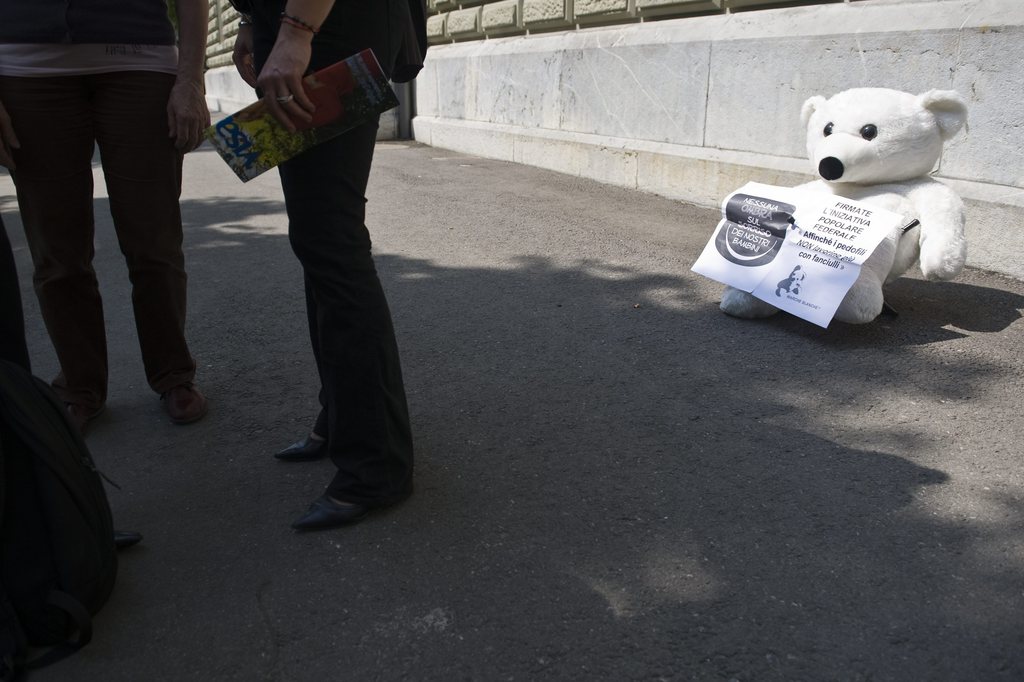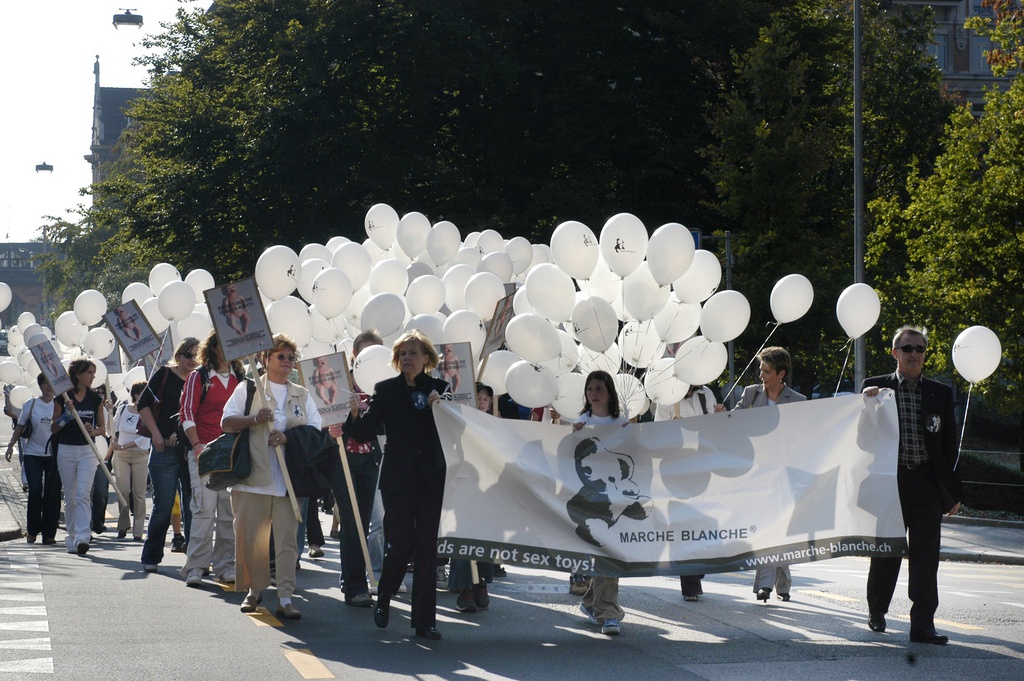Swiss to vote on paedophile work ban

Probably the most emotive issue to come before the electorate in a vote on May 18 is an initiative to ban convicted paedophiles from working with children for life, the culmination of a ten year campaign sparked by a controversy in the town of Biel.
The initiative has mainly been backed by the rightwing Swiss People’s Party and the centrist Christian Democrats. In the wake of heated debates in parliament last year, opposition was quiet as no party wished to be seen to be championing the cause of paedophiles.
However in mid-March Andrea Caroni of the Liberals decided to step into the breach and put together a cross-party committee opposing the initiative from amongst his colleagues in the House of Representatives.
The initiative, brought by the Marche Blanche (White March) group of concerned parents, would amend the Swiss constitution to ensure that “persons who are convicted because they have affected the sexual integrity of a child or a dependent person permanently lose the right to pursue a professional or volunteer activity with minors or dependents”.
The initiative needs a majority of the popular vote as well as the backing of a majority of cantons to win enough support to become law.
Critics of the amendment say its wording is too strict and disproportionate and that a revision to the penal code, passed by parliament in November and due to come into force next year, adequately deals with the protection issue.
Tragic stories of child sexual abuse are never far from the headlines and the trial of Switzerland’s biggest and most notorious serial abuse case to date began on March 17.
The 57-year-old accused man admitted abusing more than 100 children and adults with physical and mental disabilities over 29 years until the abuse came to light four years ago.
Evidence against the man, who was employed as a care worker in eight Swiss residential homes for the mentally disabled, includes photos and hours of video in which he recorded the abuse.
33 counts of abuse of mentally and physically disabled children and adults were before the court. The remainder of the cases (91 further victims) passed the statute of limitations for prosecution before the change to the law in 2008.
On March 21, he was sentenced to 13 years in prison.
New sanctions
In the three years since campaigners handed in the signatures for the initiative, despite numerous debates, the two houses of parliament failed to reach a joint recommendation for voters, for or against the initiative, as is the norm.
Previous attempts to tighten sanctions against paedophiles in parliament had come to nothing, until last November when parliament, faced with the imminent nationwide vote, revisited the work-ban issue and adopted new sanctions against convicted paedophiles.
The sanctions, differentiated based on the gravity of the offences and also applicable for non-sexual violence against children, include a ten-year ban on working with children which can be renewed by five years or extended to a life ban under certain circumstances.
Judges will also have the power to forbid abusers from contacting victims and to declare certain public places off-limits to convicted paedophiles.
The cabinet, satisfied with this legal solution, has recommended voters reject the initiative on the grounds that it is imprecise, incomplete and contravenes the principles of Swiss and international law.
But the initiative campaigners do not want to leave work bans at the discretion of judges, pointing to the legal system’s poor track record of protecting children, the 2004 case in Biel being just one blatant example.
Five key national child and youth organisations have come out against the paedophile work-ban initiative, on the grounds that it is inadequate and unconstitutional.
In a joint statement issued on April 8, the Swiss Association of Youth Groups (SAJV), Jungwacht Blauring (Catholic scouting and girl guides organisation), Pfadibewegung Schweiz (non-denominational scouting a girl guides organisation), SATUS Schweiz (umbrella organisation for Swiss gymnastics and sports clubs) and the Swiss Foundation for Child Protection, expressed their support for the alternative child protection measures accepted by parliament in December 2013, pointing out that the work ban provided for in the new legislation extends to voluntary activities.
The government announced on April 9 that these measures will come into force from January 2015.
“The initiative creates the impression that the introduction of an automatic [work-ban] sanction will lead to complete protection from sex offenders. But that is only a superficial security: first offenders will not be affected and it is a tragic reality that only 5% of crimes result in a conviction,” the statement read.
The organisations call for urgent investment in prevention work and protection measures as the most effective way to avoid sexual and violent assaults on children.
“Best” candidate
The case involved a teacher who had been convicted of child sexual abuse. After completing his sentence, he successfully applied for a new teaching job in the town working with children aged around 13.
When word got out, Marche Blanche organised a protest march and a petition calling for the man’s dismissal. But the school board defended its decision, arguing that he had been the “best” candidate for the job.
The cause was then taken up by two politicians but failed to gain any traction in parliament. After waiting for the two unsuccessful parliamentary initiatives to run their course, Marche Blanche decided to take the issue to the people, finally handing in the required signatures in April 2011 to force a nationwide vote.
Marche Blanche has convinced voters on child-protection issues before, most recently in 2008 when 52% of the electorate accepted a proposed constitutional amendment to remove the statute of limitations for sexual or pornographic acts committed against children under 12. Before then, victims had until the age of 25 to take legal action.
In 2012, 1,203 people were charged with sexual activities involving children in Switzerland, according to the Federal Statistics Office. The unreported incidence of child abuse is estimated to be much higher.
It is estimated that up to one in four women and one in ten men in Switzerland have experienced sexual abuse in their childhood.
This includes one-off incidents and non-contact offences, such as exhibitionism.
Two thirds of victims are girls, one third boys.
The age group most affected is from seven to 12.
Some children experience this form of violence just once, others suffer repeated abuse, sometimes over years.
(Source: Swiss Child Protection Association)
Debate
Natalie Rickli, Swiss People’s Party parliamentarian and member of the initiative’s committee defended the initiative tooth and nail in parliament.
“It is actually sad that voters have to take it upon themselves to launch such initiatives because politicians fail to take action. Especially when safety is one of the most important tasks of the state,” she said.
“We have to protect society and particularly children or dependent persons from repeat offenders. That is exactly what this initiative is about. When a paedophile is convicted , he should no longer be allowed to work with children or dependent persons, professionally or in his free time,” she added.
In the same debate, Isabelle Chevalley of the centrist Liberal Greens agreed with the principle that people convicted of serious paedophile crimes should not be allowed to work with children, but argued that the wording of the initiative was too narrow.
“There are loopholes in the people’s initiative submitted to us. You have to realise that the vast majority of cases of sexual abuse of children take place within the family circle. And in those cases the initiative could, unfortunately, change nothing. A broader legal text would be needed to truly protect the majority of abused children.”
Chevalley also made the point, mentioned by cabinet in its commentary on the initiative, that because the initiative provided for the ban to be imposed automatically, without discretion, cases of young couples on either side of the age of consent (16) risked falling under the terms of the work ban.
Christine Bussat, founder of Marche Blanche, dismisses this claim, arguing that these sorts of ‘boyfriend-girlfriend’ cases do not come to court in Switzerland. Under the Swiss criminal code an exception to the definition of statutory rape is made when the age difference is less than three years.
Monika Egli-Alge of the Forensic Institute Eastern Switzerland (Forio), a psychologist who provides therapy for paedophiles and risk analysis reports for the courts, believes an automatic work ban is a step in the wrong direction.
“In my opinion it is important that we do everything to protect children from any kind of sexual abuse. In the area of paedophilia we need to create services, to make sure that those who want help receive help, or are thoroughly examined when they are a danger to society,” she told swissinfo.ch.
“Those who present a danger to children can already be adequately dealt with within the framework of the existing law. The sanctions are there but we have to impose them. That requires bold decisions and moral courage on the part of the courts and authorities.”

In compliance with the JTI standards
More: SWI swissinfo.ch certified by the Journalism Trust Initiative











You can find an overview of ongoing debates with our journalists here . Please join us!
If you want to start a conversation about a topic raised in this article or want to report factual errors, email us at english@swissinfo.ch.